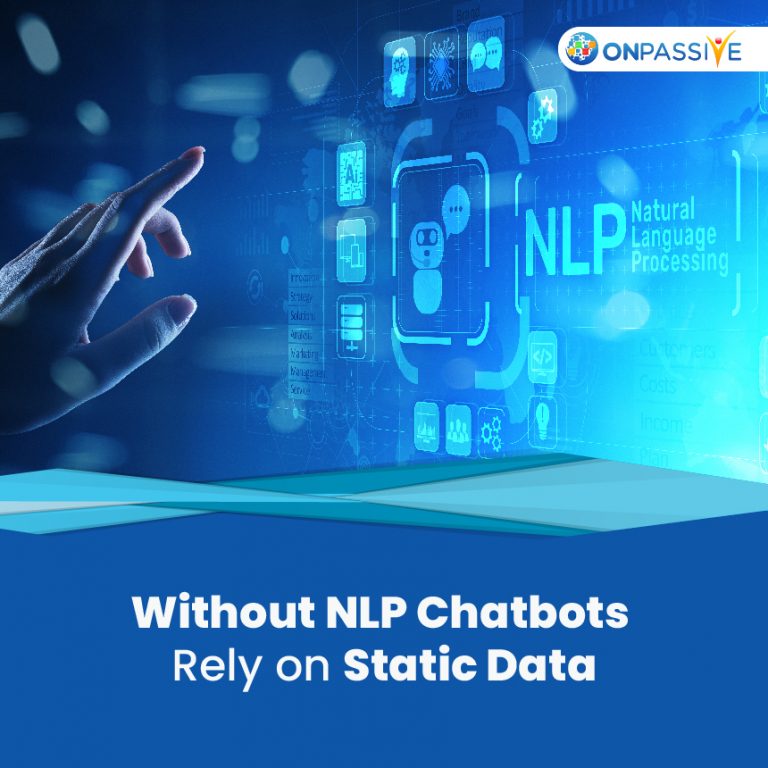
With chatbots in recent years increasingly prevalent, they have been used in many different applications across industries as script and linear conversations with a default output. Although this has served the function of multiple applications, it is now essential that companies build and implement Chatbots with natural language processing, which evaluates, analyses, and communicates with its users, like a human being, to give a novel experience.
Let’s understand the use of Chatbots with natural language processing.
What is Natural Language Processing?
Natural Language Processing or NLP is a deep learning-based technique that allows machines to understand the meaning from user input. As per Bots’ context, the purpose of the user’s feedback is evaluated, and answers are then produced based on contextual analysis inspired by the human being.
The way we interpret, and experience knowledge processed through our five sensory systems from the world around us forms our unique internal mental maps of the world, which is a key element of NLP.
Importance of NLP
NLP is important because it allows to overcome language uncertainty and adds helpful numerical structure to the data for many downstream applications including voice recognition and text analysis.
Machine Learning is the most used NLP technology, which aids in overcoming language barriers. When the volume of data available online grows, so does the need to navigate and analyze it. Machine Learning can be used to translate data from one language to the next. The NLP approaches to aid the computer in comprehending the meaning of sentences, which increases machine learning effectiveness.
For example, NLP enables technology like Amazon’s Alexa to comprehend what you are saying and react appropriately. AI that relies on language inputs is nearly useless without NLP.
Chatbots with Natural Language Processing
Chatbots are designed for a variety of purposes, including FAQs, customer support, virtual assistance, and many more. Thus, Chatbots without natural language processing rely heavily on pre-programmed static data and are therefore ill-equipped to deal with human languages, which vary in emotions, meaning, and sentiments to convey each question.
Natural Language Processing is what helps chatbots to understand and respond to your messages. When you start a message with “Hello,” the NLP informs the chatbot that you have sent a standard greeting, allowing the chatbot to use its AI to come up with a decent answer. In this scenario, the chatbot would almost certainly reply with a greeting.
A chatbot cannot tell the difference between the responses “Hello” and “Goodbye” without NLP. “Hello” and “Goodbye” would be nothing more than text-based user inputs to a chatbot without NLP. Natural language processing aids AI in determining the best response by providing context and interpretation to text-based user inputs.
What are AI-based Chatbots?
AI-based chatbots are text- or voice-orientated interfaces that aid and connection to human use by simulating conventional person-to-person conversations, with the resources or information they need.
Text-based chatbots are most often used online to provide customer service and information on websites and social media channels. On the other hand, voice-based chatbots are most often used for customer service and sorting or over-the-phone. For several years, most mobile phones have integrated chatbot and smart speakers have chatbot feature as fashionable gift products.
How AI and NLP Transform Chatbots?
Chatbots are beneficial to companies and customers, as they eliminate obstacles to data access, from physically handicapped to technical skills, streamline navigation to link users to results in a timely manner and provide a cost-effective alternative to employing support personnel or contracting with telecommunications centers.
Artificial intelligence chat services can potentially provide a quicker and easier interface than a human career in several scenarios. Here are a few examples of how AI chatbots are deployed every day when this fits too good to be true:
- Website Navigation
- Lead Nurturing Chatbots
- Phone-Based Customer Service Portals
- Virtual Personal Assistant Bots
If you are looking for AI-powered Chatbots with natural language processing, O-Chat by ONPASSIVE is an idle product for you.
Conclusion
Chatbots’ future is unusually strange. The intelligent chatbots are unbelievable if you take the time to feed them the information they need to develop and make a big difference. This intentionally powered feature will fill the gap between consumers and businesses and make sure your chatbot is something that your business customers want to talk to. Contact us to know more about NLP and why you should switch to artificial intelligence.



Gulmohammad Fanan
3 years ago